“Loud as a Whisper”
Written by Jacqueline Zambrano
Directed by Larry Shaw
Season 2, Episode 5
Production episode 40272-132
Original air date: January 9, 1989
Stardate: 42477.2
Captain’s Log: The Enterprise is ferrying a mediator named Riva to Solais V, a planet that has been ravaged by a very long war. They have requested Riva specifically, and also that the Enterprise only bring Riva, that they not get involved in the negotiations.
Riva is deaf and mute. He speaks through a chorus, three people who are attuned to his thoughts and emotions—one representing his intellect and artistry, one representing passion, and one representing balance, harmony, and wisdom. Riva’s deafness is a hereditary condition among the ruling class of his people, and his chorus has been with him since childhood.
Data provides a briefing, but Riva cuts him off before he gets very far. The war has lasted so long that the two races are almost extinct, and the reasons for the war are pretty much irrelevant—it’s gone on so long, it’s become personal.
When they arrive at Solais, the cease-fire has been broken. Riva insists that the fighting stop if he is to beam down. After the firing stops, Riva picks a spot for the negotiations to take place: a hilltop. He and the chorus beam down along with Riker and Worf (Riva insists on a minimal away team), and asks for torches and a three-sided table.
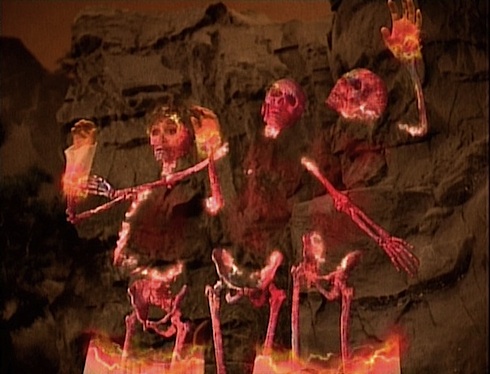
The factions arrive, and Riva starts to negotiate—but one person rejects the notion and starts firing, killing all three members of the chorus. Riker, Worf, and Riva beam back. The fighting starts again, and Riva is unable to communicate. Pulaski can’t use prosthetics, because he is genetically incapable of hearing. However, Data learns the sign language Riva uses, and they are able to communicate with him.
Eventually, he figures out a way to make the tragedy work for him: he will teach them how to sign, forcing them to learn a common language together.
Thank You, Counselor Obvious: Troi pretty much manipulates Riva by telling him that she’s going to try to negotiate on Solais. She gets him to talk about how to conduct the negotiations in order to make him realize that he can still do it. It’s a fairly standard psychological ploy, but also an effective one, as it gets Riva out of the dumps and gets him to finish the job. (And she’s definitely manipulating him. The people of Solais specifically requested Riva and said the Enterprise can’t get involved. There’s no way they’d even consider Troi as a negotiator.)
If I Only Had a Brain…: Data learns sign language by reading through the computer records at ludicrous speed. This raises the interesting question—why use so awkward a method? Why not just plug directly into the computer? Or use a wireless interface? (Yeah, yeah, this was 1989, but sheesh.)
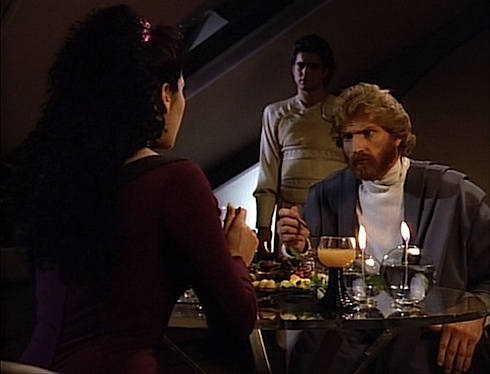
No sex, please, we’re Starfleet. Riva expresses an interest in Troi from the word jump, and they have dinner together, accompanied only by the member of his chorus that represents passion, leaving the other two behind (wah-hey!). Eventually, the third wheel leaves, and they manage to communicate more directly, with Riva using gestures to “speak” to Troi.
There is No Honor in Being Pummeled: Worf is uneasy about meeting Riva. He says there was no Klingon word for peacemaker before Riva negotiated several treaties between the Federation and the Klingon Empire. It’s implied that he negoiated the peace between the two powers, though that would later be established as happening shortly after Star Trek VI: The Undiscovered Country. Of course, we have no idea how old Riva is or how he ages, so he could well have been around seven decades earlier….
I’m a Doctor, Not an Escalator: Pulaski offers La Forge the opportunity to regenerate his optic nerves—which La Forge had been told was impossible. He’d have normal vision—which would be inferior to what he has with the VISOR, but he wouldn’t be in constant pain. This procedure would never be mentioned ever again (though La Forge would switch to bionic eyes in the movies).
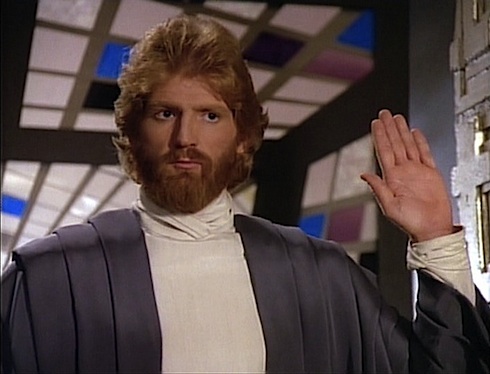
Welcome Aboard: Howie Seago, who is deaf, plays Riva. He’s a bit overdone while being interpreted by the chorus—he seems a lot more comfortable when he’s alone and signing. Marnie Mosiman, Thomas Oglesby, and Leo Damian do a fine job as his chorus—indeed, when they’re killed it comes as a tremendous shock, and their loss is keenly felt.
I Believe I Said That: “Our job is not to police the galaxy.”
“Isn’t that my speech, Number One?”
Riker being pretentious, and Picard complaining about his horning in on the captain’s action.
Trivial Matters: Seago pushed the producers of the show to do something with deaf people, and also suggested the ending to the episode. The original script called for a technobabble solution that enabled Riva to talk. This way was better.
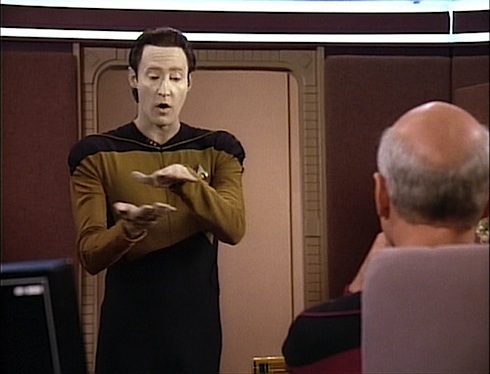
Make it So: “This is the blue ocean at sunset.” I remember liking this episode when I first watched it in 1989, but I also have no recollection of ever watching it again. Doing so now, I’m left with a giant feeling of “meh.” The episode’s pace could generously be described as “languid,” and there are long stretches of introduction and exposition with very little payoff.
Riva’s chorus is a fascinating method of communication, and the moment of their shocking murder is the most effective part of the episode. There are some interesting ideas here, but ultimately the episode feels surprisingly empty.
Warp factor rating: 4
Keith R.A. DeCandido has a bunch of new items coming out soon: the novel Guilt in Innocence, part of The Scattered Earth shared-universe science fiction project, the graphic novel Farscape Volume 5: Red Sky at Morning, continuing the post-Peacekeeper Wars story of Farscape (written in collaboration with series creator Rockne S. O’Bannon), and short stories in the anthologies Liar Liar (featuring stories about fibs and falsehoods by members of The Liars Club) and Tales from the House Band (featuring stories about music, edited by Deborah Grabien). Go to Keith’s web site, which is also a gateway to his blog, Facebook, and Twitter, not to mention his twice-monthly podcast Dead Kitchen Radio.










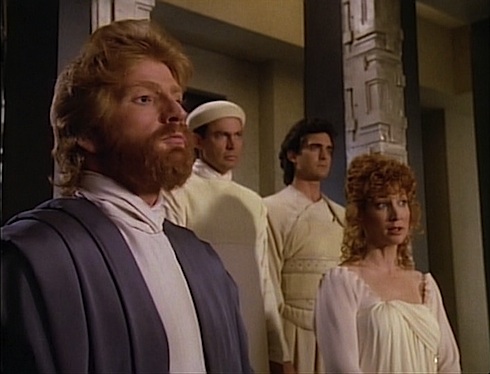
One review described the episode’s concept as “an interesting idea, poorly realized,” and I think that’s fair. I remember feeling so-so about this episode when it aired, I think because the series still hadn’t grown out of what I call its Aesop’s Fables mode–stating baldly (whether or not Picard was doing the talking) the moral message of the episode (essentially, in this case, “been given a lemon, make lemonade!”)
Having said that, I now have to give brownie points to any episode (including this one and “Darmok,” another episode about which I was ambivalent when it first aired) that shows non-Earth people communicating in a manner other than directly speaking the King’s Rigellian. (From “The Simpsons:” You’re speaking English? No, we’re speaking Rigellian–all languages sound the same!”)
Regarding why Data doesn’t simply “plug in” – remember Kryten’s “Groinal Socket” from Red Dwarf? Perhaps they couldn’t find a place to plug in that didn’t seem weird in some way.
No, you are right, they simply hadn’t thought of the joys of wireless connectivity. But Kryten was hilarious, and I had to throw it in.
JWezy: I never, ever object to a Red Dwarf reference in general, and a Kryten reference in particular. Kryten was very much the anti-Data….. :)
—Keith R.A. DeCandido
As with the “exploding alien parasite” effect from season 1’s episode, the thing I remember most about this episode wasn’t the decent story about communication, it was the cheesy-icky FX for the chorus murder. I’m glad that ‘Trek moved away from that sort of thing, as it distracted from the story.
I wish I could believe this, but at this point the writers still demonstrate a blatant willingness to ignore earlier plot points just to obtain a desired outcome. If they had needed a little more time or just felt that the story would be more to their liking if Troi got involved in the negotiations, they would have gleefully done so with no regard to the earlier demands of the Solaisians.
I like this episode, both the concept and the execution. Yeah, the pace is a little languid, but that’s fitting for a contemplative piece like this. I like seeing Troi get a romance, particularly one that’s built around a meeting of minds, a union over the principles of communication that are central to who and what Deanna is. Ron Jones’s score is fantastic, including a beautiful romantic theme for Troi and Riva and a Gerald Fried-esque motif for the warriors on the planet. And I really like the ideas of the episode. The acknowledgment of people with different senses and different ways of communicating is good to see (and I guess the Geordi subplot was meant to tie into that, although I believe it also reflected some behind-the-scenes discussions about maybe letting LeVar Burton stop using the VISOR prop). And the message about turning disadvantages into advantages resonated strongly with me; it’s advice I’ve often tried to follow in my writing.
Thomas Oglesby (the “Scholar/Artist” in the chorus) is better known as Randy Oglesby, who’s played seven different onscreen roles in Trek (tied with Jeffrey Combs, J. G. Hertzler, and Thomas Kopache), the most prominent of which was Degra in ENT’s third season. And Marnie Mosiman (“Harmony”) is the wife of John de Lancie (Q) and mother of Keegan de Lancie (Q Junior).
This is still one of my favorite early TNG episodes: in large part because, as don3comp said above (#1), it takes seriously that not everyone communicates via the Universal Translator (if we’re being charitable, and don’t think everyone really is speaking Engish!). It’s also one of the few times I can recall Trek directly taking on living with “disabilities.” As you pointed out, krad, even Geordi eventually got “bionic eyes,” implying that he, at last, became “normal” and got a “happy ending.” Riva is a compelling character and Seago does a great job potraying him.
I would love to know more about how people are chosen to become part of the choruses. I think the episode very deftly establishes an intriguing alien culture that would be nice to revisit at some point.
Except that even when he had the Ocular Implants, he still saw in Predator-vision. It was a big issue in Insurrection when he regenerated his actual eyes – and lost them again when he left, for whatever reason… – that he’d never seen a real sunset. I never really understood why they couldn’t just have his VISOR or the implants switch to a ‘normal’ mode. I mean, we’re pretty close to being able to do that ourselves.
As for the episode… much more interesting a concept than an actual episode. I always wondered why Riva couldn’t just… write things down?
Data would eventually plug into the ship’s computer, as seen in “Best of Both Worlds, Part II”.
Little trivia nugget for you: Marnie Mosiman is Mrs. John de Lancie.
That’s what happens when I don’t hit refresh after reading the review. Sorry about the redundancy.
For those of us who actually know some sign, there’s an amusing blooper when Data interprets for Riva. Seago uses ASL, and there are times when Data interprets into English what Riva signs before he actually signs it. Nomi and I always enjoy watching that bit over and over.
— Michael A. Burstein
To me, this episode was pretty average for the first couple seasons. Not astounding, but not bad at all. However, I do feel the need to mention something:
At the very beginning of the episode Picard calls Riker in to show him a small planetary model. I know that this is just filler, and has no point in relation to the episode (except for the Moral of the Story: Things that are different are just as good) but this seems to me to be the most pointless conversation ever held on a TNG episode. Forgive me for the long post, but I feel the need to rehash the conversation for the viewers that don’t have the benefit of reviewing the episode on demand.
PICARD: Come. Ah, Number One, look at this. [A small solar system model is being projected over his desk with one planet in an irregular orbit.] Ever since we left the Lima Sierra system I have been puzzling over how the third planet could maintain such an orbit when it’s theoretically impossible. But consider this [he presses a button and the planets rotate faster.]
RIKER: There’s no degeneration.
PICARD: Exactly.
RIKER: Why?
PICARD: Why? I haven’t a clue.
RIKER: Well, perhaps this facsimile lacks the proper mass.
PICARD: Perhaps. But if this is an accurate representation it could explain what happened in that system.
RIKER: Perhaps.
PICARD: Well it’s not a matter of any great moment, just a knot I had to untie.
What knot exactly did Picard untie!?! The planets in the model didn’t move. Sure they rotated, but (as Riker says) there’s no degredation. Did Picard’s model prove anything at all? “Gee, years ago we found a planet with a very peculiar orbit. Maybe this model that shows no degeneration will explain it.” Or, if something catastrophic had happened in that system, what did Picard prove by having planets in repeating orbits spin around his desk? If one of them suddenly flew off at Livingston (the lionfish), I would understand what the model is proving. Of course Riker suggests that the model lacks the proper mass, so maybe the model didn’t work as intended, but that makes it even worse. If anyone can think of any possible explanation for this conversation, please let me know. All I do now is drink with my friends any laugh uproariously at how nonsensical the entire conversation is.
I am sorry if this comes off as abrasive in any way. I love TNG and this is a good episode, I meant this post as a joke and a possible observation, not for any insult or offense.
This episode stands out for me due to the death of the chorus. I am glad you put a picture of it, in the article. I did not expect it, and the glowing red skeletons made it look like a horrific death. It was very disappointing when the the infamous Varon-T disruptor from the episode “The Most Toys,” did not use the same special effect.
I’ve always liked this epsiode, in particular the concept of the chorus. I agree with #7, I’d love to know more about their culture, and how is a chorus chosen, what kind of lives do they lead, how much privacy, free time do they have, or are they solely dedicated to their “Riva”? Can they marry? Have kids?
Also, I think that Riva is so brave, deciding to stay alone on that planet, I mean, he’s just lost the three closest companions he’ll ever have, who grew up with him…suddenly he looses them, looses his voice…and yet is able to carry on, (with a little help from Troi), and try to negotiate peace with those who murdered his dear friends …wow, not your run of the mill member of a hereditary ruling class….
I liked this one, especially given that it was second season. Some nice imagery and ideas, some good character development, and a reasonable challenge to the protagonists. It was a bit slow and a little clunky, but again — second season.
@Tesh(4) For me, the cheesy graphic when the chorus was killed was rather effective. It highlighted them as individuals and did not disguise the suffering in a quick vaporization, which I thought made the impact of the event more devastating.
@15
I also think that we feel the death of the chorus more with the way they died. when a red shirt dies Sometimes near the end of the story they are just vaporized and we move on. Here we see a quick yet still morbid death and its ghastly for startrek universe.
Overall while slow i enjoyed this episode for season two. I like how it points out that humanity and aliens still have genetic disabilities and yet still have a use. Technology hasnt pushed them aside. I never really think of geordi with a disability. Maybe if there had been an episode where he lost his visor. Like troi in ‘the loss’
Thing is, it’s still a vaporization, it’s just a slow, graphics porn one. I’m not arguing for a quick “poof” either… in fact, I think it would have been more impactful if they weren’t vaporized at all, but rather, that there were bodies to mourn. Think of the pain we see when people die in the Siege of AR-whatever in DS9. Those deaths aren’t rendered in full CG gory glory, and that’s the point. They are bloodied people, and their bodies are reminders of exactly what happened, even without being the latest schlock from a Saw-addled generation.
It’s the loss that’s important, not dwelling on the gory details.
The trouble with a wireless connection is that you couldn’t “show” Data learning. Even plugging in leaves little to show. But having images fly by – that’s a tried and true method of showing rapid learning.
Was Data originally built to interface directly with Starfleet computers? Seems like an easy thing to leave out intentionally when trying to emulate a human.
Another poorly realized good idea. Better days ahead…
As for Data plugging into the computer, we brought this up when we were watching it too. I think that taking advantage of the speed at which he can watch the screen is one thing, but directly interfacing with the computer might just reinforce to Data that he is not human. The Borg Queen asked him why he insisted on linguistic communication when he was capable of more, and Data replies that it’s a trying-to-be-human issue. Perhaps the same holds true here.
They introduce an interesting idea, 3 people representing different aspects of The Deafmutoid psyche, and then do absolutely nothing with it, save for Lust Dude hitting on Counselor Pointless. Most of this episode consists of a deaf guy hammily nodding and pointing – vintage Trek. Absolutely only redeeming moment is the Randy Oglesby Chorus being incinerated by laser not phaser blasts shot by the trigger-happy monkey men. “Meh” is a tad too generous for this tedium.
Hilarious episode. The entertainment value comes from how preposterous everything is. What the episode really fails to communicate is why this deaf guy is such a successful peace-keeper. He’s pretentious, bearded, blatant, short-sighted, and demonstrates very little experience with peace talks despite being the Messiah of peacebringers. I guess he never considered violence occuring when two warring factions are present?
Interestingly enough, he demonstrates very little confidence without his “chorus” despite the emissaries from both factions agreeing to peace after the combative emissary was killed. Why do they even need him at this point?
Also, why does Data translate English into sign language for the mediator? It’s clearly established that he doesn’t need an interpreter to read lips (though he seemingly can read lips without having to look at them…) yet Data found it pertinent to translate everything into sign language anyways. A show-off, perhaps?
I find this episode highly watchable. Yes, there are some drawn out, unnecessary scenes, but the conclusion is satisfying. Does anyone else think that Pulaski was a better doctor than Crusher? The most cringe-inducing exchange occurs between Riva and Geordi. The whole “I really like who I am” dialogue by Burton with his ridiculous grin and touching Riva’s chest approach creepiness.
My biggest problem with this episode is that Riva comes across as very obnoxious throughout. He becomes a bit less of an asshole towards the end, but generally conveys a kind of arrogant self-indulgence that you see in other characters like that terraformer from S2 of DS9. The kind of character that usually represents smugness and ends up getting their comeuppance in some way. You could argue that him losing his Chorus did that, but it was far more THEM that got punished, not him.
I thought the episode was okay, but not great. The first part went too slow for me, but I thought the second half really picked up after Data learned how to interpret Riva’s signs. Also Riva showing frustration as he tried to communicate without his chorus was realistic and well done.
I was never clear on how Riva was communicating after the death of his Chorus. He is obviously deaf, but many times he’s reacting to dialogue hurled at him when his back is turned, which he then responds to. The earlier scenes with Troi led me to believe he was, to some degree telepathic, but that seemed to vanish about the time they decided he needed to sign in order to effectively communicate.
I also found it just a tad creepy as soon he as gets to the Enterprise the FIRST thing he does is hit on Troi. Yikes.
@27 Sometimes it seems that the only thing visitors to the Enterprise do is hit on Troi. Not as bad as Man of the People though.
Very “meh,” episode for me. Although I am glad some people seem to enjoy it. It has one or two nice moments, but mostly, I find it a pretty boring episode. My main parameter for judging an episode is whether or not I was engaged the whole time watching it. And in this case my interest wandered quite a bit.
@@@@@12/WaitingShadows: I agree about the inaneness of the Picard/Riker orbit discussion. There didn’t seem to be any point to the scene, other than to show how intellectually curious Picard is, and perhaps somewhat failingly trying to show what a normal conversation is like in the 24th century. Its quite a contrast to TOS, where I don’t think you’d ever find Kirk spending his free time puzzling over the physics of a particular system’s planetary orbits
Count me as falling into the category of liking this episode. No, it’s from being one of my favorites, but also like some other people, I enjoy episodes that employ other methods of communication between different species than simple verbal (English) language. I thought it was great that the method in question here is sign which I’ve always felt was beautiful. And I appreciated how they actually use a deaf actor when that’s something you so rarely see on television, even today. I thought Seago was charismatic which works for his character who is supposed to be rather cocky and sure of himself so the character growth of him being knocked down a peg when his chorus was murdered was satisfying. The chorus was also a neat idea. Yes, the episode does indeed feel languid and slow and if I should watch it late enough at night I’m pretty sure I’d fall blissfully asleep to it too. Lol
I think it also bears mentioning that Marnie Mosiman is the real-life wife of actor John de Lancie (“Q”) and therefore also the mother of the actor Keegan de Lancie who plays the son of “Q” in the Star Trek: Voyager episode “Q2”.
@24: I actually really liked the scene on the bridge where Geordi and Riva “talk” and there’s that physical touch between them. I found it sweet and very Gene Roddenberry-esque, so basically very “Star Trek”!
Well, to be fair, 24. Electone, that chest-touching seems to have been a standard form of salutation for Riva — he did it to the others on the bridge, too. (Actually, I was waiting for him to try it out on Troi, just to see what would happen!) And — again, to be fair — touch is an important facet of communication, especially for sight-impaired and hearing-impaired people.
. . . and by the way, I also thought Riva must have had some kind of ability to communicate, or at least sense thoughts or feelings, mentally. Remember — he immediately identified Troi as an empath when they first met. He couldn’t have done that through “normal” means.
Rewatching TNG while working at home and working through this one today. That moment where Picard says “You are not alone!” O captain, my captain! What a great Picard moment.
This is one of a handful episodes that I saw long after it first aired and realized I had no memory of it. I grew up with TNG, literally, as it premiered when I was 3 months old and it’s been a part of my life from the beginning. But when I watched this a few years ago it was like discovering a new episode. And I actually quite liked it. It is slow paced indeed but it’s taking its time to show us who Riva is, and that pacing allows the final act of the story to work very well. The murder of his chorus is surprising and tragic, and you can really feel Riva’s hopelessness after their loss. And the solution is an excellent one. Learning to communicate together is one of the best ways to bond with someone, it’s a great way to create peace. Indeed, it’s the crew learning about Riva and how he communicates that makes us care about what’s happening. I just think this is a very nice, very Trek episode that works without fulfilling the action quota and without contriving problems to technobabble away.
In my opinion, this is one of the best TNG episodes; almost certainly the best in its run up to this point. When TNG was in its first run, I had a close friend who was deaf, who was also a big Star Trek fan. The fact that the actor who plays Riva is deaf in real life — and that the sign language he uses is real-world ASL — was a huge deal. The story may have some weaknesses and the Troi-Riva relationship starts out somewhat cringey, but the conclusion (with Riva staying alone on the planet to teach the warring parties to communicate with each other through sign language) is very powerful. I think this episode really embodies what Star Trek is all about.
I am somewhat confused by the fact the warring factions on the planet were using lasers and yet the chorus was annihilated by what should be classified as disruptor fire. Laser technology seems like it would maybe have burned a hole in 1 member of the chorus at best
Speak to me! Speak directly to me!
… Says it all.
The scene with LaForge and Riva on the Bridge is like something out of See No Evil, Hear No Evil played straight.
I had very little recollection of this episode and was expecting it to go in a more predictable direction: Riva would be revealed as maybe not a fraud exactly but possessed of some kind of telepathic power making others highly suggestible, whether he was aware of it or not, explaining his sterling track record and refusal to hear much background of the factions’ fractious history before diving into negotiations, this ability to impose his will perhaps even explaining Deanna’s growing interest after first being taken aback by him. I’m glad it didn’t go that way. I also loved Riva being told that he was not alone by Picard and was delighted by the final scene between Picard and Troi, no matter that it felt likely tacked on due to a script running short, as did the nonsensical conversation between Picard and Riker about the planetary system.